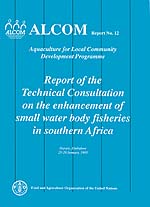 | ALCOM GCP/INT/555/SWE
Aquaculture for Local Community Development Programme GCP/RAF/277/BEL
ALCOM Report No. 12
Report of the Technical Consultation on the enhancement of small water body fisheries in southern Africa
Harare, Zimbabwe
25–29 January 1993
by
Boyd A. Haight
Senior Aquaculturist
ALCOM
Funding Agencies:
SWEDISH INTERNATIONAL DEVELOPMENT AUTHORITY
BELGIAN ADMINISTRATION FOR DEVELOPMENT CO-OPERATION
Executing Agency:
FOOD AND AGRICULTURE ORGANIZATION OF THE UNITED NATION
Harare, Zimbabwe, January 1994
|
| The designations employed and the presentation of the material in
this publication do not imply the expression of any opinion
whatsoever on the part of the Food and Agriculture Organization of
the United Nations concerning the legal status of any country,
territory, city or area or of its authorities, or concerning the
delimitation of its frontiers or boundaries. |
Preface
This document reports on the discussions and decisions resulting from a Technical
Consultation on the Enhancement of Small Water Body Fisheries in Southern Africa.
It was organized by ALCOM under its project “Utilization of Small Water Bodies for
Aquaculture and Fisheries” which is financed by Belgium.
The consultation was held 25–29 January 1993 in Harare, Zimbabwe, and was attended
by 52 participants and observers from within and outside the region.
The objective of the consultation was to review the status of small water body fisheries
and estimates of their potential in southern Africa, and suggest management action
which will bring exploitation closer to resource potential and also benefit local
communities.
The document summarizes the proceedings of the consultation's three sessions. It
contains the findings and recommendations of four working groups of consultation
participants. It also contains abstracts of some of the papers presented at the
consultation.
ALCOM is a regional aquaculture and fisheries programme of the FAO (Food
Agriculture Organization of the United Nations). It is based in Harare, Zimbabwe, and
covers all the SADC countries. The aim of ALCOM is to assist member countries to
improve the living standards of rural populations through the practice of aquaculture.
Toward this end, pilot activities are conducted in member countries to demonstrate new
ideas, techniques and methodologies. Successes achieved, ideas derived, lessons learnt,
are applied on a wider scale by member governments.
ALCOM is funded by Sweden and Belgium. Its preparatory phase began in October
1986, and its first implementation phase in October 1990.
| Abstract |
| The Technical Consultation on the Enhancement of Small Water Body
Fisheries in Southern Africa was organized by ALCOM in Harare,
Zimbabwe, from 25 January to 29 January, 1993. Fifty two participants
and observers from within and outside the region attended. |
| This report of the consultation summarizes the proceedings of the
opening session and the three technical sessions of the
consultation -- on “Small reservoir resource”, “Resource assessment
methods” and “Management and exploitation methods”. The decisions and
recommendations of four working groups -- on “Assessment methods”,
“Enhancement options”, “Fishery management and extension” and
“Environment” -- are summarized. Two tables sum up the present status
of knowledge on small water body fisheries in southern Africa, and
parameters for a small water bodies data base. Abstracts of 23 papers
presented at the consultation are reproduced. |
Introduction
Opening
Keynote Address
Session 1: The Small Reservoir Resource
Session 2: Resource Assessment Methods
Session 3: Management and Exploitation Methods
Findings and Recommendations of Working Groups
Group 1: Assessment Methods
Group 2: Enhancement Options
Group 3: Fishery Management and Extension
Group 4: Environment
Concluding Remarks
Tables:
1 Status of Knowledge about small water bodies in Southern Africa
2 Parameters for small water bodies database which May be used for comparative studies aimed at creating predictive models
Appendices:
1 List of Participants
2 Agenda
3 List of Documents
4 Abstracts
How to Order
